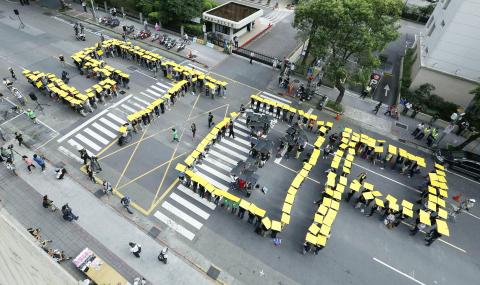About 300 people held up two-sided yellow and black boards to form the English word “Stop” in front of the legislature in Taipei yesterday afternoon to protest against the proposed national referendum on the construction of the Fourth Nuclear Power Plant in Gongliao District (貢寮), New Taipei City (新北市), that is likely go to a second vote this week.
The demonstrators were mainly young people, a few with small children, but some middle-aged people were also present. The protest wasorganized by the National Nuclear Abolition Action Platform, an alliance of several civic groups advocating an end to nuclear power in Taiwan.
Flipping the boards in unison, the demonstrators shouted “Stop” in response to the organizers when they called out: “dangerous nuclear power,” “10,000 years of nuclear waste” and “bird-cage referendum,” to demand that lawmakers put a stop to nuclear power plants.

Photo: Patrick Lin / Reuters
The alliance said that although the nuclear-free marches held on March 9 drew more than 220,000 participants across the nation, they represented only a part of the civic anti-nuclear force, citing several public opinion polls showing that up to 70 percent of the public oppose completing the Foruth Nuclear Power Plant.
However, due to the phrasing of the referendum question proposed by the Chinese Nationalist Party (KMT) and the Referendum Act’s (公民投票法) requiring more than 50 percent of registered voters for a plebiscite to pass, the plant’s completion will be approved if fewer than 9.15 million people vote against it, the alliance said.
The protesters then flipped their boards one at a time to symbolize how “a single spark can start a prairie fire” — one of the main themes of the anti-nuclear movement.
Green Citizen Action Alliance secretary-general Tsuei Su-hsin (崔愫欣) said that although the anti-nuclear groups and individuals may seem insigficant and scattered, the government should not underestimate the collective strength of civil society.
Later, holding a long yellow banner that read “refuse nuclear power, terminate the Fourth Nuclear Power Plant,” the demonstrators encircled the Legislative Yuan as they sang a song by the Labor Exchange Band (交工樂隊) called Nuclear-Free Homeland March.
After the demonstration ended in the evening, an event was held at a stage set up by the Legislative Yuan in which anti-nuclear activists and public figures from various sectors of society spoke on nuclear issues. After the speeches, musicians, including Blackhand Nakashi (黑手那卡西) and Hakka singer-songwriter Lin Sheng-xiang (林生祥), performed to show their support for the cause.

Alain Robert, known as the "French Spider-Man," praised Alex Honnold as exceptionally well-prepared after the US climber completed a free solo ascent of Taipei 101 yesterday. Robert said Honnold's ascent of the 508m-tall skyscraper in just more than one-and-a-half hours without using safety ropes or equipment was a remarkable achievement. "This is my life," he said in an interview conducted in French, adding that he liked the feeling of being "on the edge of danger." The 63-year-old Frenchman climbed Taipei 101 using ropes in December 2004, taking about four hours to reach the top. On a one-to-10 scale of difficulty, Robert said Taipei 101

Nipah virus infection is to be officially listed as a category 5 notifiable infectious disease in Taiwan in March, while clinical treatment guidelines are being formulated, the Centers for Disease Control (CDC) said yesterday. With Nipah infections being reported in other countries and considering its relatively high fatality rate, the centers on Jan. 16 announced that it would be listed as a notifiable infectious disease to bolster the nation’s systematic early warning system and increase public awareness, the CDC said. Bangladesh reported four fatal cases last year in separate districts, with three linked to raw date palm sap consumption, CDC Epidemic Intelligence

US climber Alex Honnold left Taiwan this morning a day after completing a free-solo ascent of Taipei 101, a feat that drew cheers from onlookers and gained widespread international attention. Honnold yesterday scaled the 101-story skyscraper without a rope or safety harness. The climb — the highest urban free-solo ascent ever attempted — took just more than 90 minutes and was streamed live on Netflix. It was covered by major international news outlets including CNN, the New York Times, the Guardian and the Wall Street Journal. As Honnold prepared to leave Taiwan today, he attracted a crowd when he and his wife, Sanni,

Taiwanese and US defense groups are collaborating to introduce deployable, semi-autonomous manufacturing systems for drones and components in a boost to the nation’s supply chain resilience. Taiwan’s G-Tech Optroelectronics Corp subsidiary GTOC and the US’ Aerkomm Inc on Friday announced an agreement with fellow US-based Firestorm Lab to adopt the latter’s xCell, a technology featuring 3D printers fitted in 6.1m container units. The systems enable aerial platforms and parts to be produced in high volumes from dispersed nodes capable of rapid redeployment, to minimize the risk of enemy strikes and to meet field requirements, they said. Firestorm chief technology officer Ian Muceus said